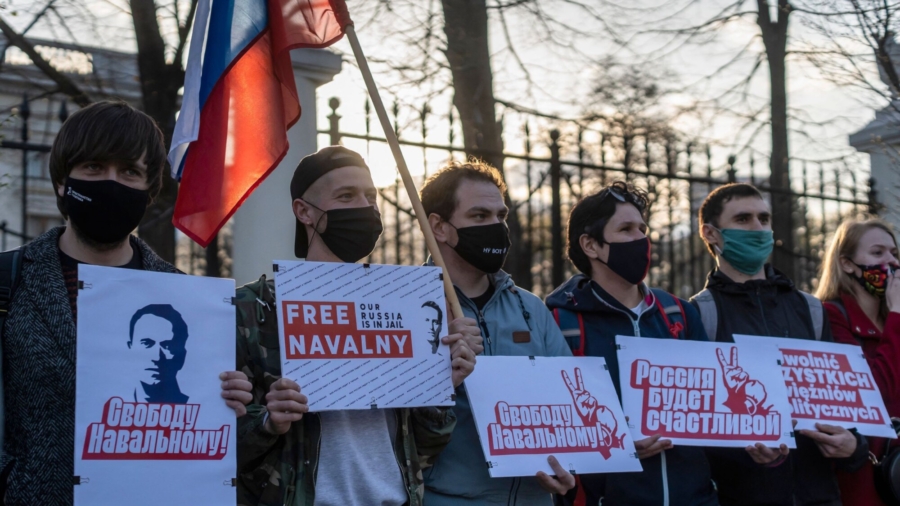Russian authorities on Monday blocked access to a website linked to imprisoned opposition leader Alexei Navalny ahead of this month’s parliamentary election.
State communications overseer Roskomnadzor blocked the website for the “Smart Voting” project, which was created by Navalny’s team in 2018. The website aims to identify candidates who are in the strongest position in the Sept. 19 election to defeat candidates from United Russia, the party that dominates the parliament and is President Vladimir Putin’s power base.
Before Monday, the website for the Smart Voting project was one of the only websites linked to Navalny and his associates that hadn’t been blocked by Roskomnadzor, although Navalny’s associate Leonid Volkov had anticipated that officials would try to do so, according to Latvia-based Russian-language newspaper Meduza.
It comes after months of efforts to neutralize Navalny and his supporters ahead of the election.
In June, the Moscow City Court outlawed Navalny’s Foundation for Fighting Corruption and a network of his regional offices as extremist organizations. The ruling barred people associated with the groups from seeking public office and exposed them to lengthy prison terms.
Roskomnadzor said it blocked the Smart Voting website “because it is being used to continue the activities and holding events of an extremist organization.”
“The reason for terminating the use of this service is the requirement of the Prosecutor General’s Office of the Russian Federation to restrict access to information resources related to organizing the work of the Anti-Corruption Fund,” it said.
The court said in June that extremist organizations “under the guise of liberal slogans” are “engaged in creating conditions for the destabilization of the social and socio-political situation.” They “destabilize the socio-political situation in the country, including by calling for violence, extremism, riots,” by trying to involve minors in illegal activities.
According to prosecutors, these organizations “are coordinated by foreign centers conducting destructive activities in relation to Russia.” The true goals of the organizations are “to create conditions for a change in the foundations of the constitutional order, a change of power and the implementation of the scenario of a ‘color revolution.'”
Historically, “color revolutions” refer to popular uprisings intended to overthrow tyrannical regimes through non violence, such as those that were seen in former Soviet states, such as Ukraine and Georgia. However, the tactics have since also been applied to sow discord in society to elicit regime change.
Putin, as far back as 2014, warned that Moscow must prevent “so-called color revolutions” in Russia, citing threats posed by “radical” Internet sites that recruit youths.
“In the modern world, extremism is being used as a geopolitical instrument and for remaking spheres of influence. We see what tragic consequences the wave of so-called color revolutions led to,” he said. “For us, this is a lesson and a warning. We should do everything necessary so that nothing similar ever happens in Russia.”
This month’s election is widely seen as an important part of Putin’s efforts to cement his rule before Russia’s 2024 presidential vote.
Navalny, Putin’s most determined political challenger, was arrested in January upon his return from Germany, where he had spent five months recovering from a nerve agent poisoning that he blames on the Kremlin—accusations that Russian officials reject. He was handed a 2 1/2-year prison sentence in February for violating terms of a suspended sentence stemming from a 2014 embezzlement conviction that he denounced as politically driven.
Putin, 68, has been in power—either as president or prime minister—for more than two decades. He pushed through constitutional changes last year that enable him to run again in 2024 when his current six-year term ends. The changes would allow him to potentially hold onto power until 2036.
Putin earlier this year signed legislation barring members of groups deemed extremist, including allies of Navalny, from running for office. The move, critics say, was designed to stamp out opposition to United Russia. The Kremlin denies the crackdown is political.
In an Instagram post on Monday, Navalny’s team said that the move to block the Smart Voting website shows that Russian authorities are “panicking” and “afraid.”
“So we are doing everything right,” the post said. “In two weeks, we will go to the polls and vote wisely.”
Navalny, meanwhile, published a step-by-step guide on his Instagram Stories, detailing how supporters could attempt to bypass the block.
The Associated Press and Reuters contributed to this report.
From The Epoch Times


